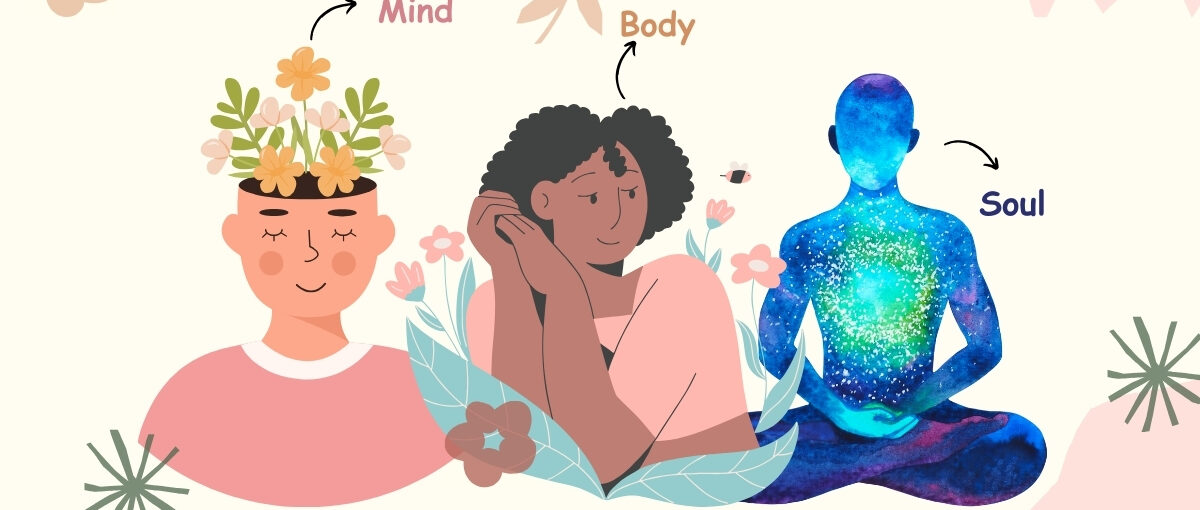In the realm of holistic well-being, the interconnectedness of mind, body, and soul plays a pivotal role in shaping mental health. This holistic approach recognizes that each facet—mind, body, and soul—is intricately linked and influences one another in profound ways. Understanding this interconnectedness not only enhances our grasp of mental health but also opens pathways to more integrated and effective approaches to healing and maintaining wellness.
The Mind: Seat of Thoughts and Emotions
The mind is often regarded as the locus of our thoughts, emotions, perceptions, and consciousness. From a psychological perspective, it encompasses cognitive functions such as reasoning, memory, and decision-making, all of which shape our mental landscape. Mental health, therefore, heavily depends on the state of our minds—the quality of our thoughts, the management of emotions, and our overall cognitive functioning.
1. Cognitive and Emotional Well-being: Mental health is closely tied to cognitive and emotional well-being. When the mind is balanced, thoughts are clear, emotions are regulated, and individuals can effectively manage stress and adversity. Cognitive therapies like Cognitive Behavioral Therapy (CBT) highlight how changing thought patterns can alleviate symptoms of anxiety and depression, underscoring the powerful influence of mental processes on emotional states.
2. Mind-Body Connection: The mind-body connection underscores how mental states can influence physical health. Chronic stress, for example, can manifest physically as headaches, digestive issues, or even cardiovascular problems. Conversely, practices like mindfulness meditation demonstrate how cultivating mental clarity and calmness can positively impact physical health, promoting relaxation and reducing physiological markers of stress.
The Body: Physical Manifestations of Health
The body serves as the tangible vessel through which we experience life. Its health and vitality are fundamental to overall well-being, influencing both mental and emotional states profoundly.
1. Physical Health and Mental Well-being: Physical health directly impacts mental well-being. Regular exercise, for instance, stimulates the release of endorphins—neurotransmitters known for their mood-lifting properties. Exercise has been shown to reduce symptoms of depression and anxiety, illustrating the bidirectional relationship between physical activity and mental health.
2. Nutrition and Brain Function: The significance of nutrition cannot be overstated concerning mental health. The brain requires a balanced diet rich in essential nutrients to function optimally. Deficiencies in vitamins, minerals, and omega-3 fatty acids have been linked to increased susceptibility to mental health disorders. A diet that supports brain health contributes to improved cognitive function and emotional stability.
The Soul: Nourishing the Essence of Being
The soul encompasses the spiritual dimension of human existence—the core of our identity, values, and beliefs. It provides meaning and purpose, fostering a sense of connection to oneself, others, and the universe at large.
1. Spirituality and Resilience: Spirituality plays a significant role in resilience and coping mechanisms. For many, spiritual practices such as prayer, meditation, or connecting with nature provide solace during times of adversity. Research suggests that individuals with a strong sense of spiritual well-being often exhibit better mental health outcomes, including lower levels of stress and improved overall life satisfaction.
2. Community and Social Support: The soul finds nourishment through meaningful connections and a sense of belonging within communities. Social support networks play a crucial role in mental health, offering emotional validation, practical assistance, and a sense of camaraderie. Strong social ties have been linked to reduced risks of depression and anxiety, highlighting their importance in fostering resilience and emotional well-being.
Integrative Approaches to Mental Health
Recognizing the interconnectedness of mind, body, and soul opens doors to integrative approaches that encompass all aspects of human experience:
1. Mindfulness-Based Therapies: Combining mindfulness practices with psychological therapies enhances self-awareness and emotional regulation, promoting mental resilience and well-being.
2. Holistic Wellness Practices: Integrative wellness approaches incorporate physical activities, nutritious diets, and spiritual practices to foster comprehensive well-being.
3. Complementary Therapies: Techniques such as yoga, acupuncture, and art therapy complement traditional mental health treatments, addressing both physical and psychological aspects of health.
Conclusion
The intricate web of connections between mind, body, and soul underscores the holistic nature of mental health. By nurturing each aspect—through psychological resilience, physical vitality, and spiritual well-being—we enhance our capacity to thrive amidst life’s challenges. Embracing this holistic perspective not only enriches our understanding of mental health but also empowers us to cultivate wellness in all dimensions of our lives. As we continue to explore and integrate these connections, we move towards a more balanced and harmonious approach to mental health and overall well-being.
Understanding how the mind, body, and soul interplay offers profound insights into the holistic nature of mental health. By nurturing each aspect—through psychological resilience, physical vitality, and spiritual well-being—we can achieve a deeper understanding of ourselves and cultivate wellness in all dimensions of our lives.







